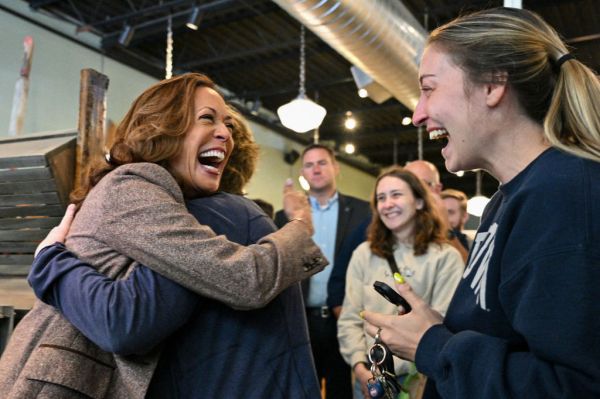Political content on social media is shocking by design, never more so than right now. Fifty days out from a presidential election, after one of the two candidates just escaped another assassination attempt, is practically the Olympics for lowbrow provocateurs.
But the most shocking post I saw this weekend didn’t come from a Resistance lib fantasizing about Donald Trump’s violent death or a New Right edgelord mistaking grilled chicken for grilled cat. It came from David Frum, the very picture of a normie center-right Republican and a Never Trumper of longstanding.
“I have an intuition that this weekend in September is the weekend the 2024 presidential campaign stopped being close,” he wrote on Sunday morning, before news broke about the assassination plot. He meant (I think!) that Kamala Harris is now on her way to a convincing victory over Trump.
I was stunned.
Frum has watched this electoral slasher movie as many times as I have. He should know by now how it goes: Just when you think you’ve finished off Jason, that’s when he’s standing right behind you.
He isn’t the only right-leaning intellectual to sound optimistic about a Harris victory, though. On Friday David Brooks reminded readers that populist eras have a cultural shelf life and speculated that Trump is either approaching his political expiration date or is past it. “People can be up in arms for only so long,” he wrote. “The wearier we grow with American carnage catastrophizing, Trump seems not just monstrous but, worse, stale.” Harris’ happy-happy-joy-joy campaign is a better fit for the cultural shift we’re allegedly experiencing, or will soon experience, Brooks argued, and that’ll help her on Election Day.
Which feels like the scene in the movie where a group of teens, after fleeing in terror, finally stop running and one of them breathlessly declares, “We’re safe now”—only to be run through instantly with a machete.
I do not share Brooks’ and Frum’s optimism about Harris’ chances, you won’t be surprised to learn, but I do share their exhaustion with this era and with this moment in particular. It’s understandable that they’ve let their exhaustion lead them to optimism about the race. Any civic-minded person should feel the urge to puke after consuming the last week or so of campaign news; it’s a small leap from there to assuming that swing voters must feel it too, and that November might at last produce the great cathartic barf so many of us desire.
I’ll believe it when I see it. But the nausea is real.
Puke week.
It makes sense that old-school pundits would find the past week encouraging for Harris. They yearn to believe that Americans are still a basically responsible people, and responsible people reward self-discipline and punish demagoguery in their political leaders.
The Democratic nominee was notably self-disciplined last week while the Republican nominee and his supporters behaved notably more demagogically than usual. Which is really saying something.
It began at the debate, where Harris threw her opponent off-message by needling him about his insecurities. One can and should wonder why she continues to struggle in interviews to answer even the most predictable economic questions coherently, but one can also see why most viewers thought she bested Trump face-to-face. She hatched a strategy to discombobulate him and keep him on defense, and then she executed it to perfection. That takes intelligence and discipline—both “presidential” qualities.
There’s evidence that she helped herself by doing so. A new Yahoo News/YouGov poll published on Saturday found her bouncing out to a 4-point lead nationally among likely voters, up from a single point last month. Harris leads by 9 points now when people are asked whom they expect to win the election. Previously she had led by 3 on that metric.
On the other side of the ballot, meanwhile, the witch hunt directed at Haitian immigrants in Springfield, Ohio, has become one of the most disgraceful episodes of Trump’s disgraceful career.
Jonathan Last isn’t exaggerating when he says it resembles a blood libel. “Haitians are eating pets” doesn’t match “Jews are eating babies” for outlandishness, but the point of both smears is the same: to reduce some foreign cohort to the status of savages who deserve expulsion or worse. “You look at Haiti, you look at the demographic makeup, you look at the average IQ—if you import the third world into your country, you’re going to become the third world,” Donald Trump’s son and potential political heir said last week, eliminating whatever shred of subtlety remained in all of this.
I understand how Frum and Brooks might conclude that the episode is too cartoonishly racist and gross even for an America that’s gotten used to Trumpy politics, especially since Trump himself isn’t ringleading the effort. The country may have developed a tolerance for his insanity, but it’s unclear if that tolerance extends to his running mate, the “smart” populist in the party who happens to be the demagogue-in-chief in this matter.
As the claims about the Haitian immigrants and their pet-munching ways began imploding this weekend, J.D. Vance turned up on the Sunday shows to declare that he regrets nothing. “If I have to create stories so that the American media actually pays attention to the suffering of the American people, then that’s what I’m going to do,” Springfield’s representative in the Senate boasted to CNN.
He clarified that, in saying that he aims to “create stories,” he didn’t mean lying or fabricating but calling attention to actual complaints he’s heard from constituents about problems with national import, like immigration. But in this case, that’s a distinction without a difference. The rumors of pet-eating are baseless according to both Springfield’s mayor and Ohio’s governor. By promoting the rumors before confirming them, Vance served his constituents by inciting a panic that’s led to days of threats against local schools and officials, and which has now forced the city to cancel an annual street fair due to security fears.
If you want to believe that Vance and Trump have hurt themselves by pursuing such a reckless smear, there’s evidence for that too. The new Yahoo News/YouGov poll found Americans skeptical about the pet-eating claims, with independents splitting on whether they were probably true or probably false by a margin of 24-51. Maybe populist dirtbaggery found a line it’ll pay for crossing.
And if not, there was lots of other garbage piled on in Trumpist quarters over the course of Puke Week whose cumulative weight, one might hope, will ultimately break the backs of swing voters.
While the Haitian hysteria was raging, a second barely sourced conspiracy theory about ABC News colluding with the Harris campaign was born, lived, and died—literally. (That wasn’t even the wackiest theory circulated to explain Trump’s debate performance.) Republicans continued to side-eye each other about their hero’s willingness to be seen in public with a crank whom even other cranks regard as déclassé. Trump and his running mate each stupidly kept on relitigating the outcome of the 2020 election, reminding Americans of the pain the right has inflicted on them once before and is prepared to inflict again if it doesn’t get its way in November.
And then, for no particular reason, Trump declared his hatred for the country’s most popular entertainer after she endorsed Kamala Harris last week.
How much can one fault Frum and Brooks for digesting all of that, reflecting on Harris’ competent debate performance, and concluding that Americans are poised to vomit Trump out at long last? It’s too much, too crude, and has gone on too long. Decent people are queasy and exhausted. And in this case, exhaustion is cause for optimism.
If an enfeebled Joe Biden were still the Democratic nominee or if we were stuck in the sort of wrenching recession that Republicans have been pining for, one could rationalize how Trump might prevail despite everything. But we’ve had a “soft landing” from inflation, and Biden’s replacement is compos mentis. She’s even made some hawkish noises about the border as she tacks toward the center. And if she’s bluffing about that, there’s likely to be a Republican Senate next year anyway to keep her in check.
If you’re still optimistic about America and trust the median voter to behave more or less sensibly, you can look at all of that and join Frum in seeing clear sailing for Harris from here.
But if you aren’t …
The puke to come.
The obvious response to rosy predictions that this race won’t be close in the end is: Why, then, is it close now?
Right, granted, the public might have been reserving judgment about Harris until it had a chance to see her speak at length without a script for an extended period. Well, we’re past the debate now—and after six national surveys taken since then, she’s gained a grand total of three-tenths of a point on Trump in the RealClearPolitics average. In the new ABC News poll that was published on Sunday, her lead was precisely the same after the debate as before.
And although she’s improved considerably on the mid-summer performance of Joe Biden 2024, she’s still running behind Joe Biden 2020. He barely squeaked out a victory over Trump in the battleground states four years ago despite solid polling leads across the board. This year, Harris is in toss-up territory across all seven.
Set Harris aside, though. If you want to know why this election will be close, reflect on this fact and despair: Trump is about as popular now as he’s ever been.
He inched above 45 percent in favorability in the spring of 2022. But apart from that, the 44.6 percent rating he currently enjoys in the polling average is one of his highest marks since entering politics. Perhaps more importantly, his favorability relative to his opponent is among the best he’s had across his three presidential runs.
Before the 2020 election, he trailed Biden in favorability by nearly 20 net points. On Election Day 2016, even the deeply unpopular Hillary Clinton held a lead of 8.4 net points over him in a losing effort. Kamala Harris’ lead in the same metric as I write this is 8.2 points.
And that’s not because, a la 2016, both nominees are widely disliked. Harris is net positive in favorability. Trump is keeping the gap close this time because around 45 percent of this country continues to rate him positively too, come what may. Indictments, insurrections, sexual abuse civil judgments, blood libels, Laura Loomer—nearly 50 percent of the American electorate betrays no sense of meaningful exhaustion with his demagoguery.
On the contrary, it would appear that he’s been so normalized that a near-majority of Americans has forfeited all claims to moral outrage with respect to anything he’s done or might do.
So what, you might think? If he locks up that 45 percent and Harris wins everyone else, that would still produce the sort of resounding Democratic win that David Frum is anticipating. The problem (well, one problem) is that that 45 percent might be an undercount. As David Freedlander noted in New York magazine:
Part of what makes Trump a difficult opponent, ex-Biden hands say, is that even when he is saying ridiculous things and turning off swing voters, he is able to reach voters who do not otherwise follow politics. “Whatever else you want to say about the Trump people, they are really good at social media, they can be really good at the pure politics of dominating a news cycle, and they are really good at getting in the head of the average person,” says one former senior official on the Biden campaign.
As if to prove the point, a Trump adviser told Bulwark reporter Marc Caputo recently that the heat they’re taking for turning pogrom-curious toward the Haitian community in Springfield is worth it because they’re fighting on political terrain that’s friendly to Trump. “We talk about abortion, we lose. We talk about immigration, we win,” the adviser said, adding of his team’s effort to blood-libel black immigrants, “We’ll take the hit to prove the bigger point.”
Swing voters might feel mildly offended by Puke Week, but if it leads to the GOP turning out an extra 1 percent of low-information voters or sending undecideds into the booth on Election Day fixated on immigration, that’s probably a net benefit to Trump and potentially a decisive one.
Even if it doesn’t, there’ll always be a few extra percentage points of reluctant support out there for a political candidate in the form of the so-called “double haters,” people who dislike both nominees but prefer one over the other for whichever bottom-line reason. Contra David Brooks, 2024 does not seem like an obvious moment to me for the “era of indignation” to end and the era of happy-happy-joy-joy to begin: A cycle dominated by anxiety about inflation and a barely-checked influx of millions of immigrants feels like a formula for continued populism rather than one for a turn back toward liberalism.
It was 2020, not 2024, that seemed to hold the secret recipe for a return to normalcy. Trump had been saddled with a pandemic and resulting economic calamity; four years as president had forced Americans to live with his maddening antics hour by hour, day by day; and his opponent was a known and reasonably well-trusted political quantity. Everything pointed to an easy Biden victory and repudiation of Trump.
Instead, with help from the left’s “defund the police” mania, Trump nearly pulled off another inside straight in the Electoral College. There’s nothing in the data to suggest he’s significantly weaker now than then. On the contrary, this year he has an opponent about whom swing voters have real doubts and an issue set, especially concerning the economy, that favors him. Take the 45 percent who still view him favorably and add on another 2-3 points that he’s likely to pick up due to inflation, skepticism of Harris, undercounting low-propensity voters, and so forth, and how can this election not be close, realistically?
And consider that things haven’t gotten as nasty as they’re likely to get. One Dispatch colleague wondered this weekend what sort of sludge about Kamala Harris—true or, probably, false—Trump is holding in reserve until October. If he falls behind this fall, he won’t coast to a gentlemanly defeat with prison waiting. He’ll say what he needs to say to keep the race tight and make Harris deny it, as any loyal National Enquirer reader/contributor would.
The disillusionment to come.
Frum and Brooks are a bit older than me (although only a bit) and therefore have longer memories of America than I do. And so logically they might be more inclined to interpret the current populist mania as a “phase” the country is going through. This era is a deviation from the civic norm, the theory goes, a remarkably successful con by a remarkable con artist; but, eventually, sense will prevail and America will be the America they’ve always known.
I hope they’re right. Because if Trump ends up winning this election in spite of everything, a lot of otherwise patriotic Americans are going to have a hard reckoning with long-held assumptions about the character of their country.
Trump critics are properly attuned to the risk of authoritarianism if he returns to the presidency, but many of us have underrated the degree of disillusionment that will be felt in the center and on the left if his relentless cretinism is rewarded with power again. One can dismiss his surprisingly strong showing in 2016 as a populist experiment driven by Clinton’s unpopularity, or his surprisingly strong showing in 2020 as an artifact of incumbency and a backlash to progressive excess.
But we’re out of excuses in 2024. America knows what it’s getting this time. No one’s being conned anymore.
The fact that this race remains close even after Democrats dumped their Biden albatross is itself a bracing indictment of what the American people have become. But if Trump were to win after attempting a coup the last time he lost, riding grotesque smears about undesirables eating pets to victory, many of us will rescind whatever benefit of the doubt remains for our countrymen’s decency and respect for shared civic values.
Were Americans conned or is this the leadership they actually want? We’re seven weeks away from knowing.










Please note that we at The Dispatch hold ourselves, our work, and our commenters to a higher standard than other places on the internet. We welcome comments that foster genuine debate or discussion—including comments critical of us or our work—but responses that include ad hominem attacks on fellow Dispatch members or are intended to stoke fear and anger may be moderated.
With your membership, you only have the ability to comment on The Morning Dispatch articles. Consider upgrading to join the conversation everywhere.